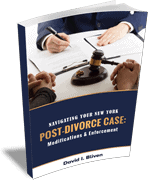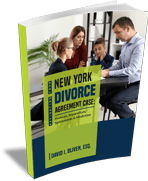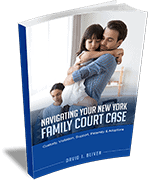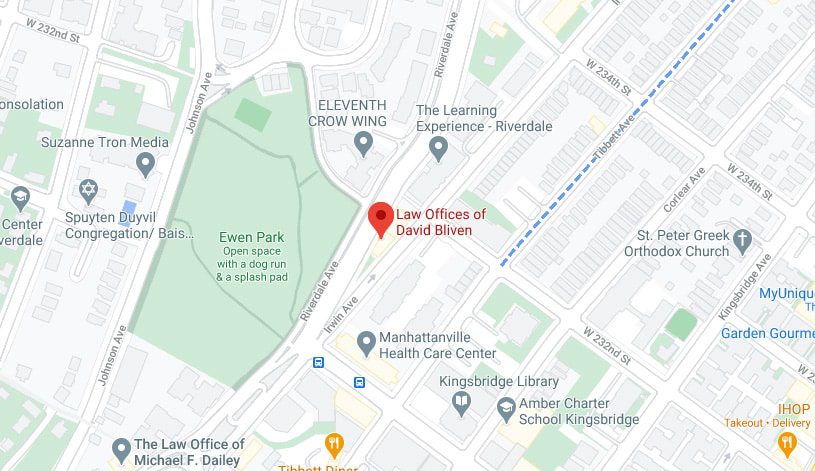Get Legal Guidance To Support Your Future
If you would like to speak with a lawyer, contact the Law Offices of David Bliven. We provide initial case assessments and can set up full case strategy consultation as needed. To get in touch, call us at (347) 745-8145 or (914) 477-0137 or reach us online.
Need access to our standard intake forms? Click here to download them from our Google Drive.
Dedicated To Family Law Concerns
Our firm concentrates our practice on a comprehensive range of Divorce & Family Law concerns, including:
- Divorce (uncontested & contested), which includes Separation Agreements, Prenuptial Agreements and Post-nuptial Agreements.
- Asset division — The equitable division of property and other assets is a difficult undertaking, especially when a couple has accumulated significant wealth. We facilitate accurate appraisal and discovery, and ensure that spouses receive their fair due.
- Alimony and maintenance — In New York, judges have a great deal of authority when deciding support payments. It is crucial that you are able to convey what you need to maintain your standard of living.
- Child custody, child visitation and child support — Children are the priority in any divorce matter. Ensuring they receive the proper care and support is essential. We work rigorously to make certain their emotional and financial needs are met.
- Domestic abuse (Orders of Protection) — Charges of household violence must be taken seriously. Victims need immediate and ongoing protection. Those who find themselves accused require adamant legal representation. We know the severity of such charges and inform our clients of their options.
- Mediation & Parent Coordinator — Mr Bliven can act as neutral mediator for both Divorce & Family Court disputes.
- Child Abuse & Child Neglect, which entails defense against such charges in Family Court. Mr. Bliven’s background as a former child welfare prosecutor gives him unique experience in this area. He also handles foster care proceedings, fair hearings, independent reviews and termination of parental rights cases.
- Adoptions, which usually involves step-parent adoptions in the non-child welfare context.
In all matters, we strive for resolution. Yet if no agreement can be reached through negotiation or mediation, we will thoroughly prepare for trial. We tailor our representation to meet the needs of your case.
As seen In New York & Westchester Magazines

Honored as a “Super Lawyer” for the New York Metro & Westchester area by Westchester Magazine, October, 2019:
Westchester Magazine

As seen in New York Magazine’s 2023 “New York Leaders in the Law”
Our Services

Divorce
For many, the divorce process can illicit feelings of fear and uncertainty. When issues such as child custody, child visitation...
Read MoreHigh Net Worth Divorce
Couples that have accumulated a great deal of wealth face particular difficulties when entering divorce proceedings. In many...
Read MoreProtection For Your Children
Children are the most important consideration in any divorce proceeding and, in New York, a number of laws are in...
Read More
Domestic Abuse
Issues surrounding domestic violence should always be taken seriously. Whether you are a victim or believe you have been...
Read MoreChild Support
These days, times are tough. Having the money and resources you need to care for your child is extremely important...
Read MoreChild Abuse & Child Neglect
The Family Court Act of New York defines child abuse as an act, or failure to act, by any parent or caretaker that results in the...
Read MoreIn many ways, family law is the most intimate field of law. It deals with the some of the most personal things in life: marriage, divorce, children, and money. What’s more, those seeking guidance in Family Court cases are often doing so during a period of extreme turmoil, emotional difficulty, and uncertainty in their lives.
With so much vulnerability and upheaval involved, and such high-stakes decisions on the line, it is essential for anyone facing a family law case to find the right family attorney—whether it be for divorce or custody or child support or domestic abuse.
Who is Attorney David Bliven?
Attorney David Bliven is a family lawyer practicing in the Bronx and White Plains, NY. As a former prosecutor with the NYC Administration for Children’s Services, Attorney Bliven is among a small percentage of family lawyers with both state prosecutorial and private practitioner experience. He uses the things he learned as a prosecutor to inform his courtroom strategy to this day.
In 2000, Attorney Bliven opened his own family law practice, The Law Offices of David Bliven. Together with a talented, hardworking team of paralegals and support staff, Attorney Bliven has been serving the Bronx and White Plains, NY as a family law attorney for over two decades. From the outset, he has stuck to one central mission: providing high-quality, personalized legal services at affordable prices.
Domestic Violence and Family Offenses: Attorney David Bliven also offers a full range of services to survivors of domestic abuse.
In a family law context, domestic violence doesn’t exclusively refer to violence between married spouses, or even between people in romantic and/or sexual relationships. It can also refer to violence between family members or violence between roommates. It also doesn’t exclusively refer to physical violence: rather, it refers to a wide range of behaviors, including threats/intimidation, harassment, and coercion in addition to physical violence, sexual assault, and theft.
Informed by his experience as a prosecutor, Attorney David Bliven knows what it takes to keep his clients safe and seek justice on their behalf. To this end, he offers comprehensive representation to domestic abuse survivors, as well as defense services for juvenile offenders and those who claim they have been falsely accused of family crimes (such as domestic violence or child abuse). In addition, he also handles:
- Orders of Protection (“restraining orders”)
- Child abuse and neglect cases
- Victim services and domestic violence survivor coordination
- Domestic abuse and custody
- Domestic abuse and divorce
- Juvenile delinquency and juvenile offense cases
If you are looking for a highly skilled divorce or family law attorney in the Bronx or White Plains, New York, don’t wait. Call family law attorney David Bliven at (347) 745-8145 | (914) 477-0137 today.
New York Family Law Blog
How To Protect Your Inheritance In A New York Uncontested Divorce
- August 18, 2025
- General Blog
Is Inheritance Considered Marital Or Separate Property Under NY Law? Inheritance is generally considered separate property, but is considered marital property once it is placed into a non-segregated account that already contains marital property. What does this mean? Imagine you…
Read MoreWhat Financial Documents Should You Gather Before Filing An Uncontested Divorce?
- August 15, 2025
- General Blog
In this article, you will discover: The documentation needed to file for uncontested divorce in New York. What account statements should be disclosed in an uncontested divorce. Whether a formal financial disclosure is required to file an uncontested divorce. What…
Read MoreHow You Can Speed Up Your Uncontested Divorce In New York
- August 15, 2025
- General Blog
In this article, you will discover: The estimated time for an uncontested divorce to become final. How to avoid delays in filing for divorce. The most efficient and streamlined way to serve divorce papers. How Long Does A Typical Uncontested…
Read MoreTestimonials
Subscribe To Our Newsletter
Please provide your name and email address to subscribe to our monthly newsletter.
Frequently Asked Questions
(1) The financial resources of the custodial and non-custodial parent, and those of the child;
(2) The physical and emotional health of the child and his/her special needs and aptitudes;
(3) The standard of living the child would have enjoyed had the marriage or household not been dissolved; (4) The tax consequences to the parties;(5) The non-monetary contributions that the parents will make toward the care and well-being of the child;
(6) The educational needs of either parent; (7) A determination that the gross income of one parent is substantially less than the other parent's gross income; (8) The needs of the children of the non-custodial parent for whom the non-custodial parent is providing support who are not subject to the instant action and whose support has not been deducted from income pursuant to subclause (D) of clause (vii) of subparagraph five of paragraph (b) of this subdivision, and the financial resources of any person obligated to support such children, provided, however, that this factor may apply only if the resources available to support such children are less than the resources available to support the children who are subject to the instant action; (9) Provided that the child is not on public assistance (i) extraordinary expenses incurred by the non-custodial parent in exercising visitation, or (ii) expenses incurred by the non-custodial parent in extended visitation provided that the custodial parent's expenses are substantially reduced as a result thereof; and(10) Any other factors the court determines are relevant in each case, the court shall order the non-custodial parent to pay his or her pro rata share of the basic child support obligation, and may order the non-custodial parent to pay an amount pursuant to paragraph (e) of this subdivision.
1. "Marital Property"
New York Domestic Relations Law section 236 defines "marital property" as all property acquired by either or both spouses during the marriage and before the execution of a separation agreement or the commencement of a matrimonial action, regardless of the form in which title is held," except pursuant to the terms of a validly-drawn separation agreement, pre/post-nuptial agreement, or stipulation of settlement.
2. "Separate Property"
The same statute defines "separate property" to mean (1) property acquired before marriage or property acquired by bequest, devise, or descent, or gift from a party other than the spouse; (2) compensation for personal injuries; (3) property acquired in exchange for or the increase in value of separate property, except to the extent that such appreciation is due in part to the contributions or efforts of the other spouse; (4) property described as separate property by written agreement of the parties (as described above).
(a) the age and health of the parties;
(b) the present or future earning capacity of the parties, including a history of limited participation in the workforce;
(c) the need of one party to incur education or training expenses;
(d) the termination of a child support award before the termination of the maintenance award when the calculation of maintenance was based upon child support being awarded which resulted in a maintenance award lower than it would have been had child support not been awarded;
(e) the wasteful dissipation of marital property, including transfers or encumbrances made in contemplation of a matrimonial action without fair consideration;
(f) the existence and duration of a pre-marital joint household or a pre-divorce separate household;
(g) acts by one party against another that have inhibited or continue to inhibit a party’s earning capacity or ability to obtain meaningful
employment. Such acts include but are not limited to acts of domestic violence as provided in section four hundred fifty-nine-a of the social services law;
(h) the availability and cost of medical insurance for the parties;
(i) the care of children or stepchildren, disabled adult children or stepchildren, elderly parents or in-laws provided during the marriage that inhibits a party's earning capacity;
(j) the tax consequences to each party;
(k) the standard of living of the parties established during the marriage;
(l) the reduced or lost earning capacity of the payee as a result of having forgone or delayed education, training, employment or career opportunities during the marriage;
(m) the equitable distribution of marital property and the income or imputed income on the assets so distributed;
(n) the contributions and services of the payee as a spouse, parent, wage earner and homemaker and to the career or career potential of the other party; and
(o) any other factor which the court shall expressly find to be just and proper.
1. Overall factors
The Judge will generally consider the stability of the child's current arrangement, each parent's home environment and financial ability to meet the child's needs, any arrangements to care for the child when the parent is unavailable, who has been the primary caretaker for the child in the years (or months) leading up to the custody filing, any drug/alcohol abuse by either parent, past criminal behavior of a parent, the mental & physical health of the parties, adverse sexual misconduct or other moral character flaws of either parent, domestic violence, as well as the child's preferences.
2. Other factors
The court will also assess each parent's willingness to foster a relationship between the other parent and the child (including issues of parental alienation and/or involving the child on parental conflict), any denial of access to the child, as well as any abuse or neglect of the child. The Court will also consider availability of either parent to care for the child, as well as false accusations made against the other party. Likewise, a party’s conduct during the pre-trial phase will be considered, such as conduct in court, illicit recordings or other unlawful conduct towards the other parent, lateness with pick-up/drop-offs or inflexible parenting approaches (e.g., one parent trying to be the dictator towards the other). Finally, the Judge will assess the parties conduct as the case is proceeding, including whether a party has misled the Court or violated any pre-trial orders.
3. Strategy considerations
First, no matter how tense the situation may be around the house, do NOT move out of the house & leave the kids with the other parent. This will automatically put you behind the 8-ball in winning custody.
Additionally, if you haven't been already, take an active part in EVERYTHING the children are involved in. Make sure his/her teachers, doctors, extracurricular activity instructors, etc. know you by your first name.
If you presently work long hours, cut it out immediately. Spend the extra time with your kids. Take them fun places & buy them nice gifts (though caution must used not to over-do it as it otherwise would look like you're trying the bribe them).
Keep a written diary of any important conversations or interactions with the other parent (a "he-said-she-said" log). Refrain from posting negative content about the other parent on social media as this is potentially discoverable - if you have something to say to a friend/family member, say it in person. Refrain from cursing or denigrating the other parent, especially in writing (I don't know how many cases I have in which one side curses or denigrates the other via text and/or e-mail).
Finally, consult a good Child Custody lawyer in your area.
- JOINT CUSTODY: In a joint custody situation, both parents have the legal authority to make major life decisions on behalf of their child concerning issues like religion, education or health care. Sometimes they agree to have "equal decision-making" which means they must reach agreement on all major decisions, or else the decision would be submitted to a mediator or Judge to decide. In other agreements, the primary custodial parent gets final decision-making after full consultation with the non-custodial parent. Joint Custody in New York is often reached via agreement but rarely imposed upon the parents by the Judge.
- SOLE CUSTODY: When a parent is given sole custody, the child will physically live with him or her, and he or she will have the ultimate authority to make everyday and major life decisions for the child.
- SHARED CUSTODY: When parents share custody, they generally split their access to the child 50/50. A shared custody situation is very rare.
- SPLIT CUSTODY: This is a situation in which at least 1 child lives with one parent, and at least 1 child lives with the other parent. Negotiating a custody plan can be complex. It is important to remember that the court ultimately looks at what is in the best interests of the child. For fathers, this means that if you and your child's mother separate, it is important to remain in the child's life as much as possible. Both parents -- custodial or noncustodial -- should keep as much physical evidence as possible that may strengthen their case.
1. Statutory Factors
The statutory factors pursuant to Domestic Relations Law 236 are:- the income and property of each party at the time of the marriage, and at the time of the commencement of the action;
- the duration of the marriage and the age and health of both parties;
- the need of a custodial parent to occupy or own the marital residence and to use or own its household effects;
- the loss of inheritance and pension rights upon dissolution of the marriage as of the date of the dissolution;
- the loss of health insurance benefits upon dissolution of the marriage;
- any award of maintenance under Domestic Relations Law, Section 236-B(6);
- any equitable claim to, interest in, or direct or indirect contribution made to the acquisition of such marital property by the party not having title, including joint efforts or expenditures and contributions and services as a spouse, parent, wage earner and homemaker, and to the career or career potential of the other party;
- the liquid or non-liquid character of all marital property;
- the probable future financial circumstances of each party;
- the impossibility or difficulty of evaluating any component asset or any interest in a business, corporation or profession, and the economic desirability of retaining such asset or interest intact and free from any claim or interference by the other party;
- the tax consequences to each party;
- the wasteful dissipation of assets by either spouse;
- any transfer or encumbrance made in contemplation of a matrimonial action without a fair consideration; and
- whether either party has committed an act or acts of domestic violence, as described in subdivision one of section four hundred fifty-nine-a of the social services law, against the other party and the nature, extent, duration and impact of such act or acts; and
- in awarding the possession of a companion animal, the court shall consider the best interest of such animal. "Companion animal”, as used in this subparagraph, shall have the same meaning as in subdivision five of section three hundred fifty of the agriculture and markets law; and
- any other factor which the court shall expressly find to be just and proper.
Other factors
Under the "any other factors" application, a Judge may consider such things as financial assistance from the parents of one spouse which allowed for the accrual of assets and/or property, unpaid work one spouse performed in the other's business as well as the period of physical separation of the parties prior to the commencement of the divorce. One common factor usually NOT considered in the distribution of property/assets is marital fault.- Parent’s reasons for seeking or opposing the move;
- The quality of the relationships between the child and the Custodial and noncustodial parents;
- The impact of the move on the quantity and quality of the child’s future contact with the noncustodial parent;
- The degree to which the custodial parent’s and child’s life may be enhanced economically, emotionally and educationally by the move;
- The feasibility of preserving the relationship between the noncustodial parent and child through suitable visitation arrangements;
- ANY OTHER FACTORS/FACTS WHICH CLIENT THINKS IS RELEVANT FOR THE COURT EITHER GRANTING – OR DENYING – THE RELOCATION (INCLUDING THE ORIGINAL CUSTODY FACTORS, ESPECIALLY TO THE EXTENT THERE’S BEEN A SUBSTANTIAL CHANGE FROM THE ORIGINAL CUSTODY DETERMINATION).
1. Consider selling
While the real estate market is not great right now (2014) for sellers, if the mortgage is otherwise eating you alive, you may have no choice but to sell. Couples often budget a mortgage factored on two incomes coming into 1 household. When the couple goes through a divorce, now they are left with trying to support 2 households - meaning 2 sets of utility bills as well as both payment of the mortgage & payment of rent for one of the parties who's moved out. It's not uncommon for this to leave the parties at the break-even point, or even leave them with less money than is needed to pay all their basic expenses. If this is the case, then the best option is to immediately put the house on the market & salvage what you can of the equity.2. Get a Co-Signor
The other option - if one party wishes to keep the house but the parties cannot afford to fund 2 households - is for the party wishing to keep the house to get a co-signor on the mortgage. That way, the party giving up his/her rights can get a buy-out from the refinance & go on with his/her life. Making these decisions sooner rather than later in the divorce process will save on attorney's fees as well as preserve equity you've worked so hard to build up in the house.1. Is shared custody pursuant to an order - or just informal agreement?
The first analysis is whether the shared custody arrangement is pursuant to court order, or just by a mutual, informal agreement. If it's pursuant to court order, then you can skip to the 2d section below. If it's pursuant to informal agreement, then you're best advised to start keeping track of the days (& even hours of those days) the child is with you. Reason being: if there's a dispute later on about whether you do indeed shared custody, then at least you have something in writing to corroborate same. You should also begin confirming the days you'll have the child with the other parent in writing. As an example, you can send a calendar to the other parent for the next month marking off "M" or "F" on the days to designate which days the child will be with you versus the other parent. In the end, you're best advised to file a petition for shared custody & get the arrangement confirmed via court order.
2. Support based on who makes more - with some exceptions
The prevailing law - however incorrect - holds that in a shared custody situation the parent who makes more is automatically deemed the noncustodial parent & is thus potentially liable for the full guidelines amount (i.e., 17% for 1 child, 25% for 2, etc.). That said, many courts deviate from the presumptive calculation in a shared custody situation & do an off-set: first, then calculate support as if the father is paying the mother support. Then they calculate as if the mother pays the father support. The difference between the two calculations would therefore be the only money changing hands. Bear in mind, however, that merely because court may deviate in a shared custody situation, it certainly doesn’t mean the court is required to do so. Judges are free – after considering all the relevant factors, to award full guidelines child support, or no child support at all (and everything in between).
1. New York has "No-Fault" Divorce now
Prior to October, 2010, one generally needed to make an allegation of fault against his/her spouse in order to get divorced. One common way around that was to do a separation agreement. The law provided that if the parties remained separated pursuant to a Separation Agreement for more than 1 year, then either could file for an uncontested divorce based on the agreement. This indeed was one of the leading reasons why people prior to the law's amendment filed for separation as opposed to divorce. Now that New York passed "No-Fault" Divorce, however, there is no longer any reason to allege fault in order to get divorced - one only needs to state that the marriage has broken down "irretrievably" for more than 6 months.
2. Other reasons for getting a Separation versus a Divorce
Once the parties are divorced, then generally if one is covered by his/her spouse's medical insurance, their insurance will terminate. This is because very few plans cover "ex-spouses." As such, a leading reason why some people still choose to get a legal separation first is to preserve continuity of insurance coverage for at least another year. With the Separation Agreement, the parties can resolve every other issue which would otherwise be brought up in the divorce. The agreement would cut-off accrual of marital assets & debts, and can equitably divide them. The agreement can also provide for custody, visitation, maintenance (i.e., alimony) & child support. The only thing the agreement cannot do is actually terminate the marriage. That takes a divorce proceeding - which either party can file for upon the expiration of 1 year (or later) from the date the agreement is signed.


























